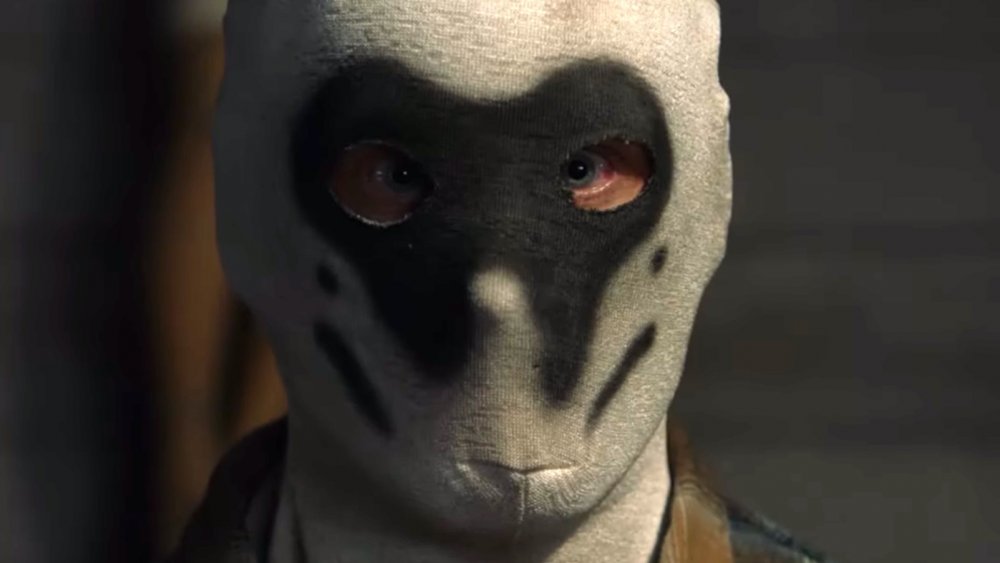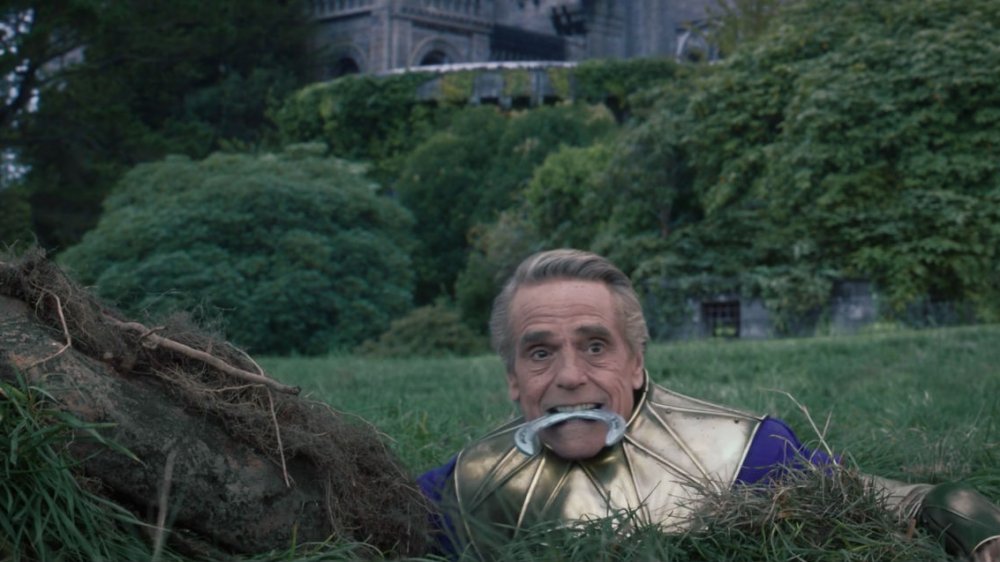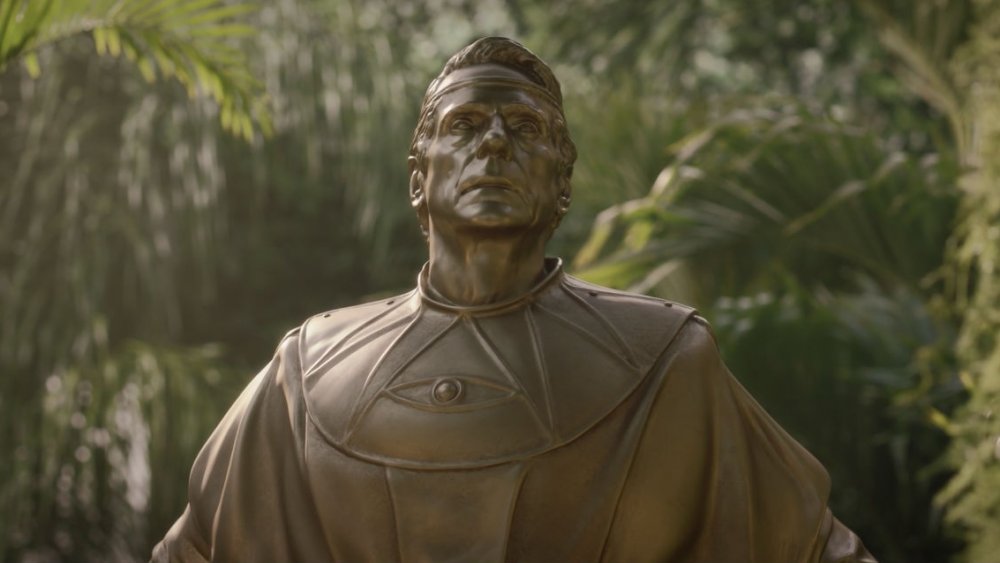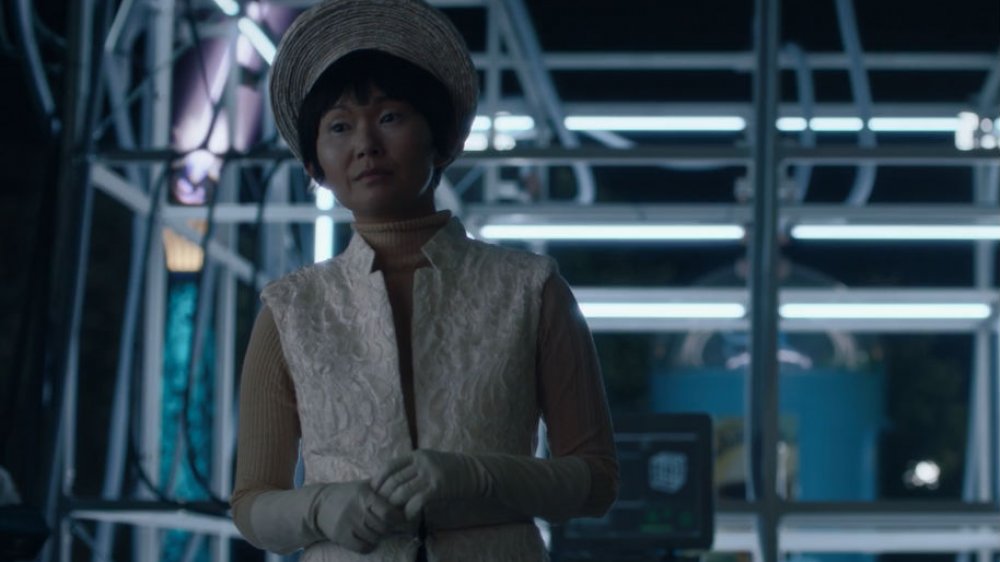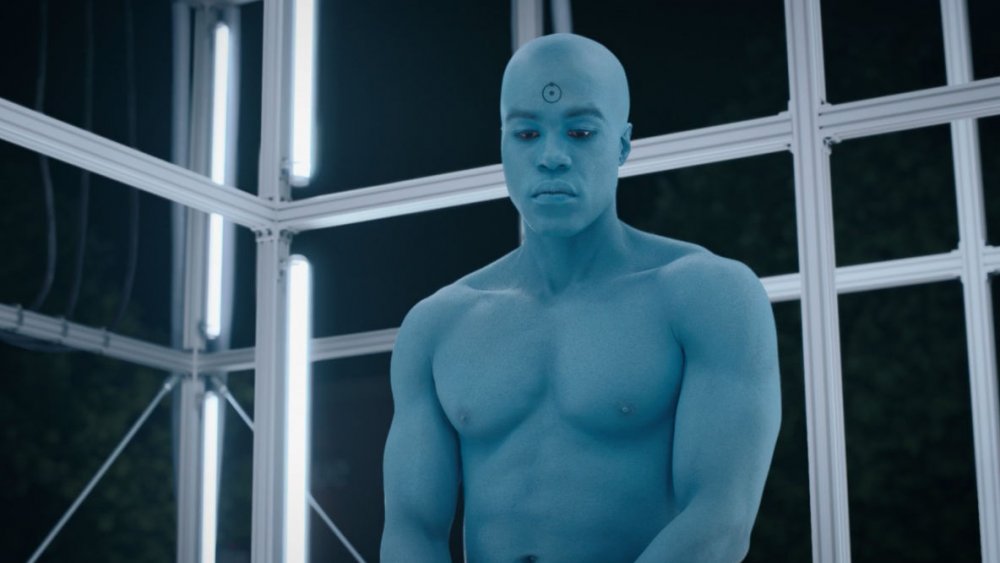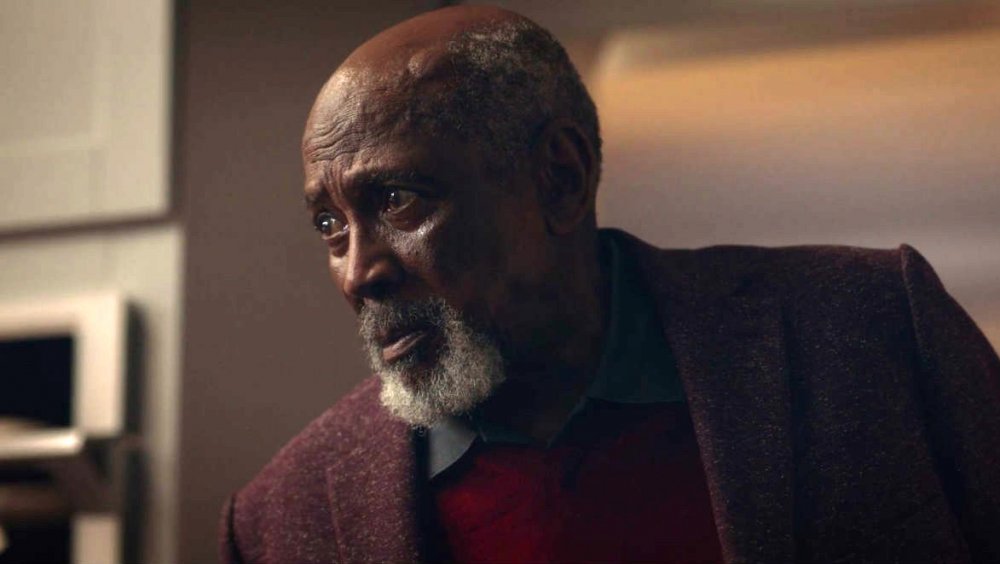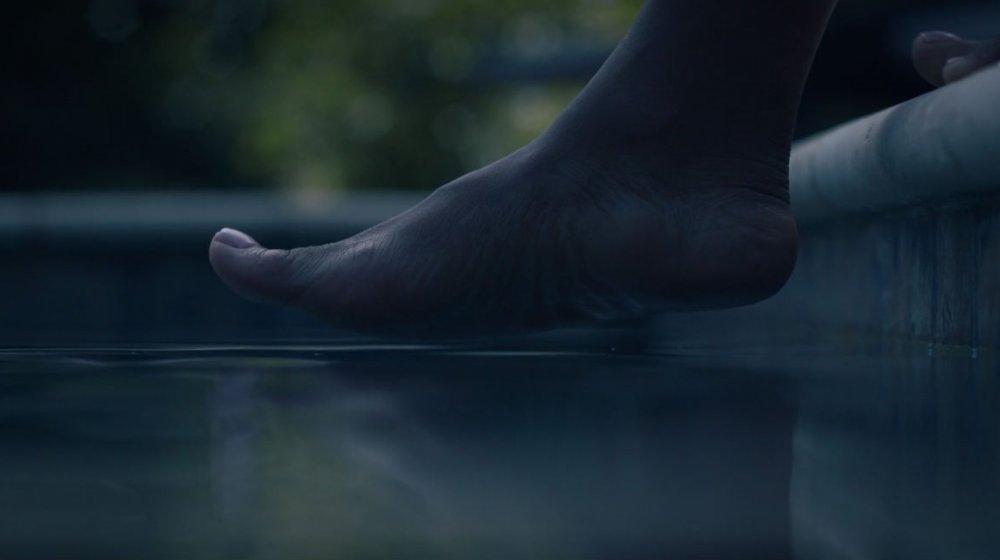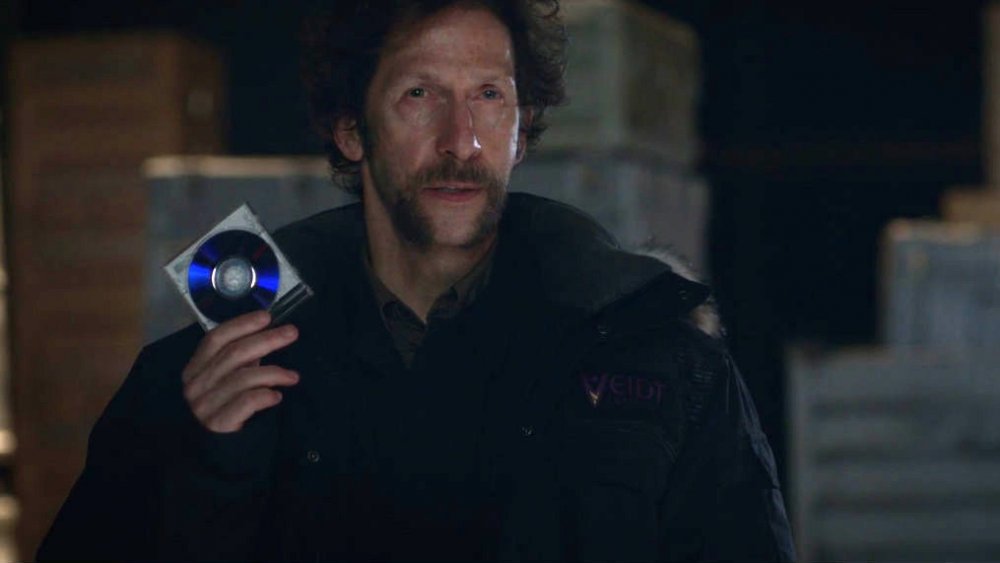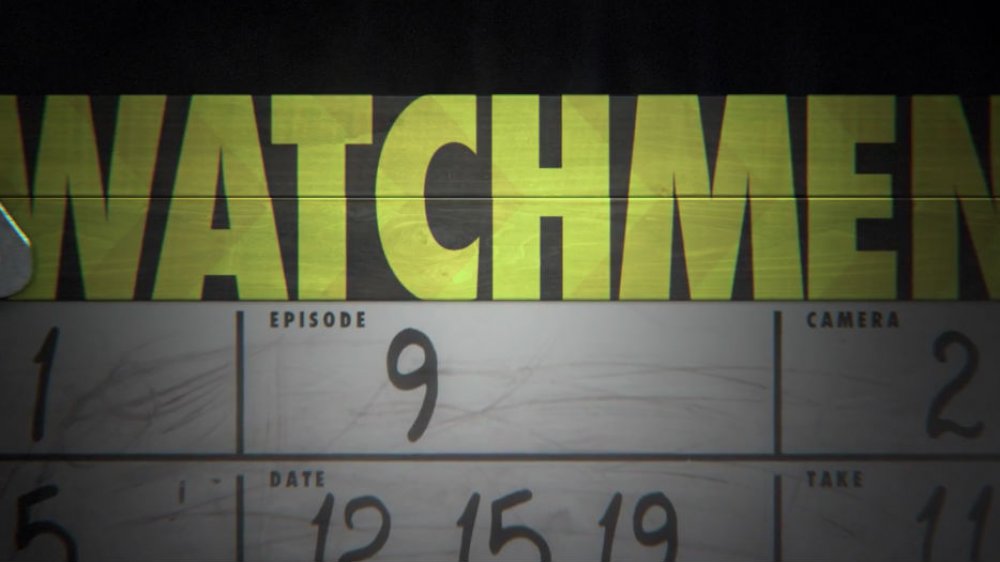Biggest Unanswered Questions In Watchmen Season 1
The first season of HBO's Watchmen — the continuation of the story from the acclaimed 1986 comic by Alan Moore and Dave Gibbons — concluded with an explosive and earth-shattering ending. The season has proven to be as complex and riveting as the source material it was based upon, and it's impossible for a story like this to not end with some unanswered questions.
The show's creator, Damon Lindelof, has gone on record saying he wanted Watchmen season 1 to be a self-contained story, and it is. Still, with time travel, heroes with the powers of gods, and secrets revealed that could dramatically change the world, it's impossible to not want to see what's going to happen next. Not to mention that while the season doesn't exactly end on what you'd call a cliffhanger, the final shot does work hard to tease us with an answer it never gives up.
With a warning that SPOILERS for HBO's Watchmen follow, here are our picks for the season's biggest unanswered questions.
Who helped Adrian escape and why?
Early in Watchmen season 1 it appears that Adrian Veidt, a.k.a. Ozymandias, has relocated from his base in Antarctica to a castle estate. In the season's penultimate episode we learn that Veidt's "estate" is on Europa, one of the moons of Jupiter.
Doctor Manhattan creates his own garden of Eden on Europa, complete with his own Adam and Eve based on a married couple he met as a child. He continues to create copies of the couple, who look to him as God. When Manhattan approaches Veidt for a way to suppress his powers, Veidt agrees, but in return he wants Manhattan to send him to Europa. Manhattan agrees, but Veidt comes to regret his decision. When he tries to escape, the clones imprison him for it. When a cake is delivered to Adrian in prison, however, he discovers a horseshoe in the dessert that he uses to dig a tunnel out of the prison. In the season finale when Veidt finally breaks free and the Game Warden pursues him, he uses the horseshoe to kill his rival.
It had to be one or more of the clones who conspire to hide the horseshoe in Veidt's cake, but what isn't clear is why they would do it. The clones seem to unanimously be furious at him for wanting him to leave, but apparently at least one of them was willing to help. We may never know who or why.
How long did Lady Trieu keep Adrian frozen before reviving him?
Throughout Watchmen season 1, we're shown Adrian Veidt's time on Europa interspersed with the events in Tulsa. By the season finale, it's clear what's going on in Oklahoma is not happening at the same time as Veidt's adventures on Jupiter's most lively moon. The proof is the golden "statue" of Veidt that Angela and Laurie Blake notice when they interview Lady Trieu.
In episode 4, Angela and Laurie visit Lady Trieu to ask her about the theft of Angela's car and its return (by being dropped out of the sky). While they're speaking with Trieu, they notice what appears to be a statue of Adrian Veidt. Laurie comments on how old he looks in the recreation — and now we know that's because it wasn't a statue. When Trieu sends a ship to rescue Veidt from Europa in the season finale, he's preserved for the trip in some kind of gold substance and the instructions he's given insist he put his hands on his hips before the procedure. The way it's shown, you could assume Trieu frees Veidt from the gold substance as soon as he lands. But because of episode 4, we know that his ship arrives on Earth long before the season finale and Trieu keeps him as a decoration long before she revives him.
In fact, we have no idea when Veidt was brought back to Earth. It could be that Lady Trieu brought him back years before Angela Abar and Laurie Blake came calling.
Given the chance, would Lady Trieu have 'fixed' the world?
When Doctor Manhattan teleports Adrian Veidt, Laurie Blake, and Looking Glass to Veidt's base in Antarctica, it doesn't take much for Veidt to convince the others that Lady Trieu needs to be stopped. Veidt calls Lady Trieu "a raging narcissist whose ambition knows no limits" and says Trieu won't be happy until she has all of humanity "prostrate before her, kissing her tiny blue feet." When Blake implies Veidt sounds more like he's talking about himself, he concedes, "Takes one to know one."
We see a lot from Trieu that supports what Veidt says. She doesn't hesitate to murder the leaders of the Kavalry and doesn't seem the least bit shaken by the act. She's been dishonest in just about every scene in which she's appeared and she's utterly ruthless. Yet all those things could be said about Veidt, who — in spite of his many faults — does genuinely hope to save humanity with his act of mass murder at the end of the original comic book series. And he doesn't seek to subjugate humanity once he's done.
It could be that if Trieu's plan had worked that, as the adage goes, absolute power would have corrupted absolutely. It's also possible that Trieu would have done exactly what she said and used her new powers to make the world a better place. Because of Adrian Veidt, we'll never know.
Why didn't Doctor Manhattan do more?
There's a lot of talk in the Watchmen season 1 finale about how little Doctor Manhattan has done to help the world with his godlike power. With his abilities, as Lady Trieu states, many of the world's problems could be alleviated if not outright eliminated. Manhattan could make food to feed the hungry, take the pollution out of the air, and turn every nuclear weapon on Earth into inert junk. He could have wiped out a racist group like the Kavalry with a wave of his hand. There really isn't much Doctor Manhattan couldn't do, yet when it comes to helping to make the world a better place, he ultimately doesn't do that much.
Why? The answer is probably as frustrating as any answer you would ever get from Doctor Manhattan about why he does, or doesn't do, anything. Manhattan doesn't experience time like we do. He lives in the past, present, and the future all at once. If you asked him "Why don't you get rid of all the nuclear weapons?" His answer would probably be, "Because I never do get rid of all the nuclear weapons." Ask him why he doesn't end world hunger, he would likely say, "I don't end world hunger because I never end world hunger." With the powers of a god, Doctor Manhattan is, ironically, a slave to seeing his entire history. Why doesn't he do more? Because he doesn't do more.
How has Will Reeves survived for so long?
One of the most momentous reveals of HBO's Watchmen comes in the sixth episode, when we learn that Louis Gossett Jr.'s character was Hooded Justice — a character who appears briefly in the comics but about whom little is initially known. In episode 6 we learn Hooded Justice was a gay black man who fought to expose the clandestine white supremacist group Cyclops. When we meet him as an elderly man in the HBO series, he's over 100 years old, yet for someone who's lived for over a century he's in miraculously good health. Even though he claims to be wheelchair-bound at first, we eventually learn he's perfectly capable of walking all on his own.
The most obvious answer to how Reeves is in such good health is Lady Trieu. She's a scientific genius who has no compunctions about using unconventional methods to achieve her goals. When Trieu is helping Angela recover from her Nostalgia pill overdose, we discover she's been hooked up to a live elephant that is somehow helping her heal from her ordeal. Someone like Trieu seems more than capable of keeping a man alive and healthy longer than normal.
Unfortunately, if it is Lady Trieu who's been keeping Will alive, then he's probably in trouble now that Trieu is dead. On the other hand, he doesn't seem like a man who would go to his grave with many regrets.
Will Angela walk on water?
The final shot of Watchmen season 1 teases us with possibility. A number of hints, both from Doctor Manhattan and Angela's grandfather Will Reeves, lead her to believe that, before his death, her late husband transferred his power into an egg.
Will tells her that Jon told him "you can't make an omelet without breaking a few eggs," and that Angela would understand when the time was right. When Angela goes to clean up the egg carton she throws on the kitchen floor in the penultimate episode, she remembers Jon telling her "Watch the eggs" as he levitated them out of the fridge. In spite of her angrily grabbing them and throwing them on the floor, one egg remains completely whole. We see a flashback of Angela's first meeting with Jon, when he tells her that, theoretically, he could transfer his power into an egg that — if consumed — would grant the eater his power. Angela takes the egg to her backyard, cracks it open, swallows the contents, and slowly reaches out to the water of her pool to see if she'll be able to walk on water like Jon. The screen goes black just as her sole touches the water.
Will she walk on the water as well as gaining Jon's other godlike powers? And if so, will she also inherit his nonlinear perspective on time? If she does, will she regret eating that egg?
What will happen when the truth about the attack on New York comes out?
In spite of his success in stopping Lady Trieu, Adrian Veidt isn't met with the universal praise and forgiveness he expects. Armed with the recordings Veidt made years before for the future President Robert Redford, Laurie Blake and Looking Glass insist on arresting Veidt and taking him back to civilization to answer for his crimes. Veidt laughs at the idea, but either his reflexes aren't as good as they used to be or he underestimates the "ignorant hayseed" Looking Glass, because the Tulsa cop knocks Veidt out with a wrench upside the head.
Assuming they make it back to civilization with Veidt and the proof of his crimes, how will the world change as a result? The whole world will learn the peace forged after what was thought to be an assault by extra-dimensional aliens was a lie. Americans will learn their current president was secretly handpicked by Veidt from the shadows.
Will the Cold War reignite? Considering the more liberal policies President Redford put into action, will the country take a hard jump to the right once the truth is revealed? Will Redford be thrown out of office? Or, alternatively, will Veidt's recordings prove no more effective than Rorschach's journal? Will most people find the revelations too fantastic to be true and ignore them as crazy conspiracy theories?
Will there be more seasons of Watchmen?
One of the biggest questions on Watchmen's fans' minds is whether season 1 will be its last. As of the airing of the season finale, we don't have an answer. The official Watchmen Twitter feed posted the message "Nothing ever ends..." the day of the season finale's release, leading some fans to speculate this was a hint that season 2 was in the works. However, the same feed would later post "The end is nigh," so it's probably best to not base your hopes on tweets.
Perhaps the main reason the question of a second season remains open is that show creator Damon Lindelof conceived of Watchmen as a single-season show. During multiple public events and interviews, Lindelof has said he wanted the first season of Watchmen to tell one self-contained story. He told Deadline the first season was designed "to be as self-contained as the original 12 issues [of the comic book]. We wanted to feel like there was a sense of completeness, to resolve the essential mystery at hand."
He hasn't completely ruled out future seasons, though he seems adamant he won't be a part of it unless there's another story he eventually wants to tell in the world of Watchmen. He's also open to the idea of stepping back and letting someone else tackle another season.
So we don't know yet whether or not Watchmen will get a season 2. All we know for sure is that if it does, we'll be tuned in.
